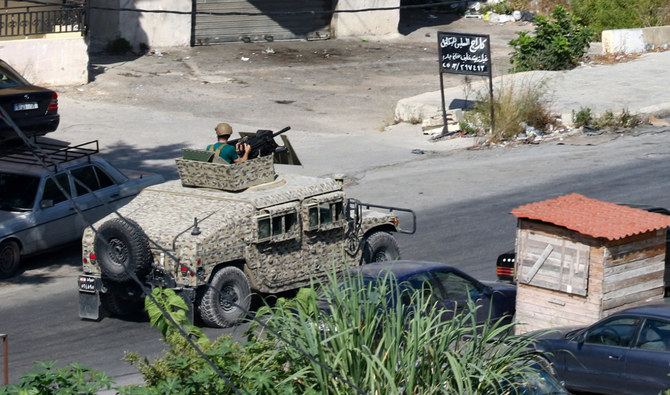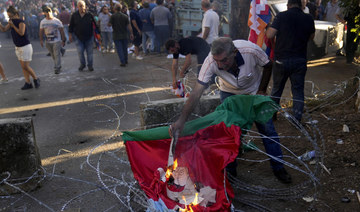BEIRUT: The driver of a van being used to smuggle people from Syria into Lebanon was killed on Thursday after he attempted to run over a soldier from a Lebanese Army patrol that was trying to stop the vehicle. He was identified as Hatem Saleh, 35, a Lebanese citizen from the border town of Mashta Hammoud.
“When an army patrol in Al-Qbor Al-Bayd area, near the banks of Nahr Al-Kabir near the northern border, tried to stop a Hyundai van carrying Syrians who had entered Lebanon illegally, the driver hit a soldier from the patrol and tried to run him over and flee the scene, despite soldiers firing warning shots, thus forcing them to fire at the van’s tires,” the army said.
“This resulted in the driver being injured, losing control of the vehicle and colliding with an electric pole, leading to his death.”
Meanwhile, a large force of Lebanese soldiers and intelligence officers raided Syrian refugee camps in Al-Aqbiyah and Al-Baysariyah on Thursday morning. Army officials said they seized about 100 motorcycles and 13 rifles, and arrested several suspects.
Army patrols have been stepped up in recent weeks after an increase in attempts by Syrians to enter Lebanon illegally in search of work, sparking protests in a country that is suffering the effects of a prolonged economic crisis. Authorities estimate that thousands of people have crossed the border.
A resident of Mashta Hammoud called Ahmed, who is a teacher, told Arab News: “The victim worked in transporting infiltrators due to the unavailability of other jobs. We live in a town directly located on the border and there are no job alternatives.”
He claimed that as much as 25 percent of the population in the region is involved in people smuggling. He estimated that up to 300 people entered the country each day in the local area, though some days there are none.
“Most of the infiltrators are registered with UNHCR (the UN Refugee Agency) and come at the end of the month to receive financial or in-kind assistance or to extend their stay in Lebanon before sneaking back into Syria, or they intend to travel by sea from Lebanon’s coasts to Greece,” said Ahmed.
Three days before the incident on Thursday, the Lebanese Army thwarted an attempt to smuggle 90 Syrian nationals into Lebanon at Haret Al-Samaqa, in Baalbek-Hermel Governorate on the border between the countries. A Lebanese national was arrested, the army said.
Since mid-August, the Lebanese Army has arrested more than 6,000 people who illegally crossed the border from Syria on foot through rugged passages that are difficult to monitor. The routes extend along Lebanon’s northern border, stretching for about 375 kilometers, and are used for smuggling drugs and goods as well as people. The illegal crossings bear the names of local tribes, as a result of their influence in the region, which is protected by Hezbollah.
A military source said that Lebanese and Syrian organized crime syndicates arrange for hundreds of Syrians, mostly young men and their families, to sneak into Lebanon to work there or travel on to other countries by sea.
“Human traffickers take advantage of the calm waters of the season to sail in boats, that are mostly unsuitable for such trips, toward European countries’ coasts in exchange for large sums of money,” the source added.
The Lebanese Army’s Land Border Regiments, in cooperation with its intelligence services, have intensified their efforts to monitor known illegal border crossings. Their operations include patrols and mobile security checkpoints along the border to inspect vehicles and check the identities of the people they are carrying.
A source from Lebanese General Security told Arab News: “Lebanon still awaits UNHCR’s data to regulate the Syrian refugee situation in Lebanon.
“While the UN agency suspended the registration of refugees in 2015, at the request of the Lebanese authorities, it resorted to providing asylum seekers with ‘codes’ to facilitate dealing with them in terms of providing assistance.
“Therefore, the number of refugees holding a code is equivalent to, or even exceeds, the number of registered refugees.”
The number of registered refugees now stands at under 800,000, according to the source.
Lebanese General Security said that the number of groups and organizations involved in assisting refugees has increased but some have not obtained the necessary licenses or authorization to engage in such activity or are carrying out activities for which they do not have permission. The agency is therefore demanding that they present their documentation for verification.
“Some of these associations are engaging in activities that violate the nature of their work,” the agency said.
“Therefore, nongovernmental associations and organizations, notably those working in the field of aiding and assisting Syrian refugees, are requested to refrain from practicing any activities that violate the content of licenses and authorizations granted to them, and to provide to the regional center affiliated with the place of their activity a copy of the license for verification of their work.”






















